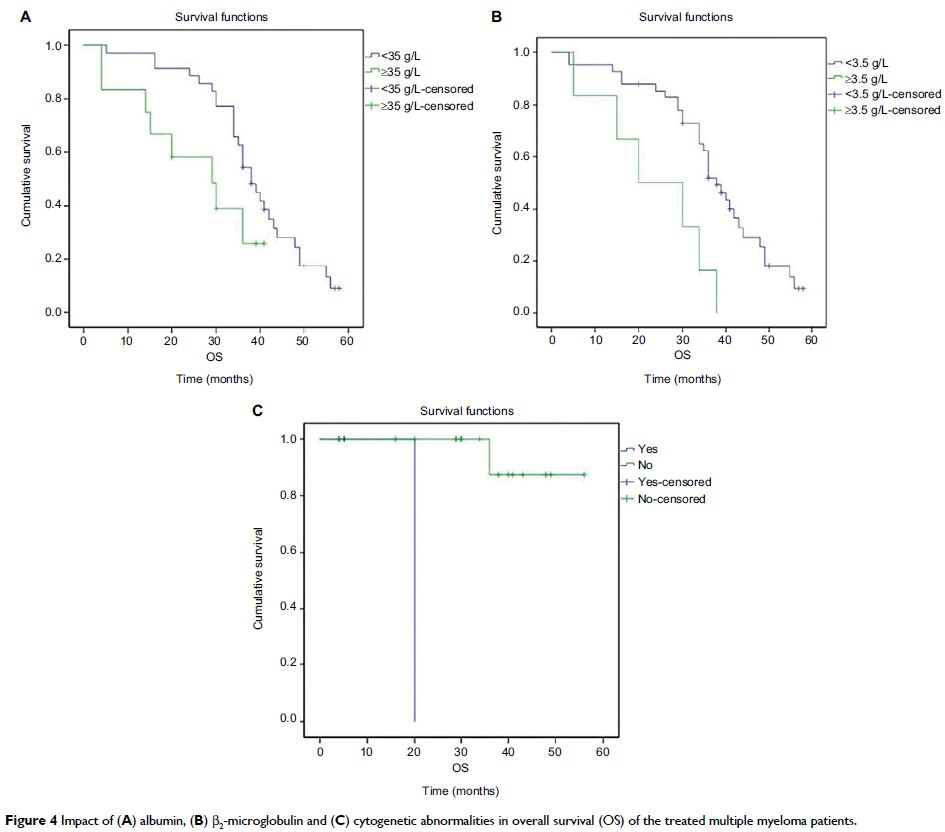109451
论文已发表
注册即可获取德孚的最新动态
IF 收录期刊
- 3.4 Breast Cancer (Dove Med Press)
- 3.2 Clin Epidemiol
- 2.6 Cancer Manag Res
- 2.9 Infect Drug Resist
- 3.7 Clin Interv Aging
- 5.1 Drug Des Dev Ther
- 3.1 Int J Chronic Obstr
- 6.6 Int J Nanomed
- 2.6 Int J Women's Health
- 2.9 Neuropsych Dis Treat
- 2.8 OncoTargets Ther
- 2.0 Patient Prefer Adher
- 2.2 Ther Clin Risk Manag
- 2.5 J Pain Res
- 3.0 Diabet Metab Synd Ob
- 3.2 Psychol Res Behav Ma
- 3.4 Nat Sci Sleep
- 1.8 Pharmgenomics Pers Med
- 2.0 Risk Manag Healthc Policy
- 4.1 J Inflamm Res
- 2.0 Int J Gen Med
- 3.4 J Hepatocell Carcinoma
- 3.0 J Asthma Allergy
- 2.2 Clin Cosmet Investig Dermatol
- 2.4 J Multidiscip Healthc

接受硼替佐米 (Bortezomib) 和地塞米松 (dexamethasone) 治疗的新确诊的多发性骨髓瘤患者的治疗和预后因素: 一个中国治疗中心的回顾性研究
Authors Chen R, Zhang X, Gao C, Luan C, Wang Y, Chen B
Received 20 June 2017
Accepted for publication 21 July 2017
Published 24 August 2017 Volume 2017:9 Pages 373—380
DOI https://doi.org/10.2147/CMAR.S144405
Checked for plagiarism Yes
Review by Single-blind
Peer reviewers approved by Dr Lucy Goodman
Peer reviewer comments 4
Editor who approved publication: Professor Nakshatri
Objective: The aim of this retrospective study was to evaluate the efficacy and
prognostic factors of bortezomib and dexamethasone (BD) chemotherapy regimen in
the treatment of newly diagnosed multiple myeloma (MM) patients in our
hospital.
Methods: A total of 47 newly diagnosed MM patients
treated in our hospital from May 2010 to September 2016 were included in this
study. All the enrolled patients received at least two cycles of BD
chemotherapy regimen.
Results: The overall response rate after treatment was
68.5% with a complete response of 23.4%, very good partial response of 17.0%,
partial response of 21.3% and minor response of 6.8%. The median time of
overall survival (OS), progression-free survival (PFS) and time to progression
(TTP) of the treated patients were 36.0, 19.0 and 18.0 months, respectively;
the mean OS, PFS and TTP were 36.0, 19.3 and 18.8 months, respectively. Though
some adverse events had occurred, none of the patients was discontinued from treatment.
Level of albumin, β2-microglobulin and cytogenetic
abnormalities were prognostic factors for OS, and plasma cell percentage in
bone marrow, β2-microglobulin and cytogenetic
abnormalities were prognostic factors for PFS as revealed by log-rank test of
univariate analysis; no prognostic factors for OS and PFS were detected by COX
regression of multivariate analysis.
Conclusion: Our study demonstrated that BD regimen was
effective and well tolerated in newly diagnosed MM patients, and prognostic
factors for patients’ survival include level of albumin, plasma cell percentage
in bone marrow, β2-microglobulin and cytogenetic
abnormalities.
Keywords: multiple
myeloma, bortezomib, treatment, efficacy, survival, prognostic factors
